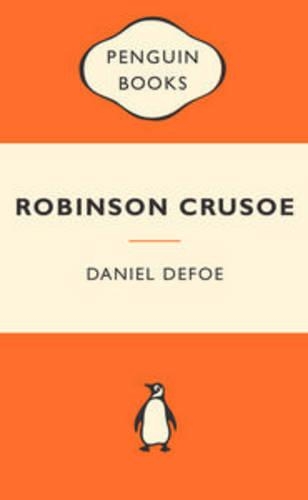
Robinson Crusoe: Popular Penguins
(Paperback)
Available Formats
Hardback
Published: 15th May 1992
Paperback
Published: 1st January 2009
Paperback
Published: 1st June 2013
Paperback
Published: 30th March 1995
Hardback
Published: 26th September 2017
Paperback
Published: 2nd January 2013
Hardback
Published: 2nd January 2014
Paperback
Published: 15th June 2001
Paperback
Published: 1st March 2007
Hardback, New edition
Published: 4th October 2021
Hardback
Published: 7th April 2021
Paperback
Published: 6th May 2008
Hardback, Reissue
Published: 1st February 2015
Paperback
Published: 1st August 2015
Paperback
Published: 15th November 2015
Paperback
Published: 1st August 2012
Paperback
Published: 20th May 2025
Paperback
Published: 5th May 1992
Paperback
Published: 25th October 2004
Hardback
Published: 5th June 2019
Publishing Details
Robinson Crusoe: Popular Penguins
By (Author) Daniel Defoe
Penguin Books Ltd
Penguin Books Ltd
28th June 2010
United Kingdom
Classifications
General
Fiction
Physical Properties
Paperback
298
Width 129mm, Height 181mm, Spine 20mm
168g
Description
The sole survivor of a shipwreck, Robinson Crusoe is stranded on an uninhabited island far from any shipping routes. At first he is in despair, but slowly, with patience and ingenuity, he transforms his dismal island into a tropical paradise. But for twenty-four years he has no human company - until one Friday, he rescues a prisoner from a boatload of cannibals.
Author Bio
Daniel Defoe was a Londoner, born in 1660 at St Giles, Cripplegate, and son of James Foe, a tallow-chandler. He changed his name to Defoe from c. 1695. He was educated for the Presbyterian Ministry at Morton's Academy for Dissenters at Newington Green, but in 1682 he abandoned this plan and became a hosiery merchant in Cornhill. After serving briefly as a soldier in the Duke of Monmouth's rebellion, he became well established as a merchant and travelled widely in England, as well as on the Continent. Between 1697 and 1701 he served as a secret agent for William III in England and Scotland, and between 1703 and 1714 for Harley and other ministers. During the latter period he also, single-handed, produced the Review, a pro-government newspaper. A prolific and versatile writer he produced some 500 books on a wide variety of topics, including politics, geography, crime, religion, economics, marriage, psychology and superstition. He delighted in role-playing and disguise, a skill he used to great effect as a secret agent, and in his writing he often adopted a pseudonym or another personality for rhetorical impact. His first extant political tract (against James II) was published in 1688, and in 1701 appeared his satirical poem The True-Born Englishman, which was a bestseller. Two years later he was arrested for The Shortest-Way with the Dissenters, an ironical satire on High Church extremism, committed to Newgate and pilloried. He turned to fiction relatively late in life and in 1719 published his great imaginative work, Robinson Crusoe. This was followed in 1722 by Moll Flanders and A Journal of the Plague Year, and in 1724 by his last novel, Roxana. His other works include A Tour Through the Whole Island of Great Britain, a guide-book in three volumes (1724-6; abridged Penguin edition, 1965), The Complete English Tradesman (1726), Augusta Triumphans, (1728), A Plan of the English Commerce (1728) and The Complete English Gentleman (not published until 1890). He died on 24 April 1731. Defoe had a great influence on the development of the English novel and many consider him to be the first true novelist.
